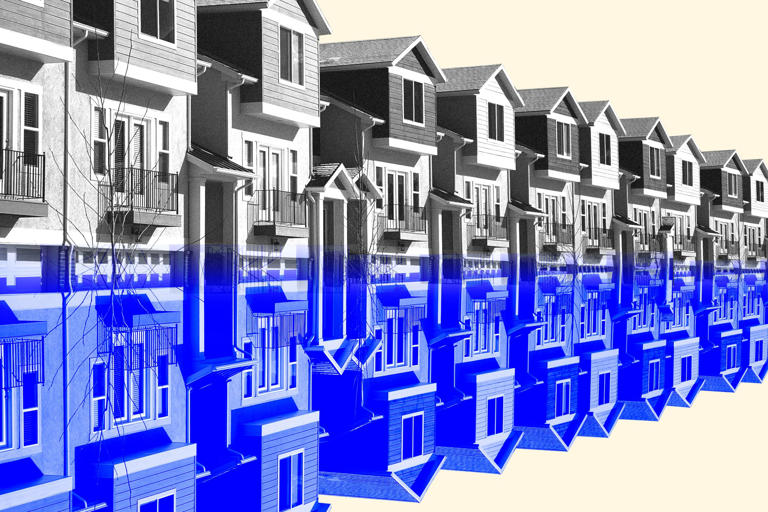After a turbulent period during the pandemic, the housing market experienced a significant slowdown last year, with total home sales dropping to their lowest level since 2011. This decline was primarily driven by a sharp decrease in existing home sales, leading to a severe shortage of available inventory for sale. However, there is optimism on the horizon fueled by baby-boomer households, as a wave of downsizing and declining homeownership rates is expected to introduce more than 9 million homes onto the market over the next decade, according to Freddie Mac.
Baby boomers wield considerable influence in the housing market, given that most either own their homes outright or have locked in low mortgage rates, and their properties generally appreciate in value. Despite the housing market facing a shortage of 2 to 7 million homes, many boomers have refrained from selling due to the significant increase in mortgage rates over the past few years.
Freddie Mac’s report addresses concerns about a potential “silver tsunami” as aging boomers look to sell their homes, which could flood the market with inventory. However, the analysis suggests that the impact will be more gradual, akin to a tide, as new entrants into the market offset the homes vacated by boomers.
In essence, while boomers may transition out of their homes in the coming decade, younger generations will continue to enter the housing market. The Urban Institute forecasts the creation of 8.5 million new households during this decade, with an additional 7.6 million expected between 2030 and 2040, the majority of whom will require housing. Therefore, the overall housing demand is projected to continue increasing in the coming years, according to Freddie Mac.
Meredith Whitney, dubbed the “Oracle of Wall Street” by Bloomberg in November 2023, made a bold prediction regarding a “silver tsunami” of baby boomers downsizing their homes in 2024 and 2025. Citing an AARP report at a Yahoo Finance Invest Conference, Whitney forecasted that 51% of individuals over the age of 50 would downsize to smaller homes, resulting in over 30 million housing units entering the market. This projection significantly exceeds Freddie Mac’s estimates and suggests a faster pace of downsizing.
Whitney emphasized that this trend would be “rate agnostic,” indicating that it would occur regardless of current market interest rates, as older individuals typically have lower mortgage rates or no mortgage at all. With 69 million baby boomers, constituting 38% of homeowner households as of 2022, their downsizing could have substantial implications for the housing market.
While baby boomers have historically posed challenges for millennials trying to enter the homeownership market, Freddie Mac predicts a gradual decline in the number of boomer households from around 32 million in 2022 to 23 million by 2035. As older boomers approach their late 70s and 80s, their homeownership rates are expected to decline further. According to Freddie Mac’s estimates, there could be 9.2 million fewer boomer homeowner households by 2035, reflecting the aging population’s shifting housing preferences.
Freddie Mac’s analysis suggests that the gradual decline in baby boomer households will be more modest in this decade before accelerating in the next. By 2028, it estimates that only 2.7 million homes will be freed up, indicating a gradual reduction over several years rather than a disruptive spike. This gradual phasing out aligns with the aging demographics of the baby boomer generation, with the majority reaching their 70s and 80s in the next decade.
However, there’s a potential caveat to this projection. Homeownership retention rates have increased over time due to longer life expectancies and healthier outcomes for older individuals. Considering that the average baby boomer is currently 67 years old and expected to live another 21 years, the decline in boomer households may be less significant than initially estimated. Using a more recent retention rate, the decline could be closer to one million fewer households, according to John Burns Research and Consulting.
Contrary to Meredith Whitney’s prediction of a rapid “silver tsunami,” other economists, in line with Freddie Mac’s analysis, believe that the downsizing process for baby boomers will be gradual. Mark Fleming, chief economist at First American, refers to this phenomenon as the “aging out process.” Given that the baby boomer generation spans from the mid-1940s to the mid-1960s, it will likely take a decade or more before a significant portion of them begin downsizing, typically around the age of 80. Thus, the full impact of the baby boomer downsizing trend may not materialize for some time.
Mark Fleming, chief economist at First American, highlighted that baby boomers are defying traditional downsizing trends by staying in their homes longer due to factors such as increased wealth and better health. This sentiment was echoed in a Fannie Mae report, which revealed that a significant portion of older homeowners have no plans to sell their homes during retirement, citing both financial and emotional attachments. Additionally, the majority expressed a desire to leave their homes to their heirs.
However, the implications of this trend extend beyond the housing market dynamics. While the gradual release of housing inventory by baby boomers may ease some pressure, it won’t fully address housing affordability concerns for younger generations. Home prices are already prohibitive for many, and the potential influx of smaller homes onto the market may not necessarily align with the preferences of younger buyers. This could exacerbate competition and drive up prices for starter homes, further sidelining millennials and other prospective buyers.
Moreover, baby boomers typically have more financial resources at their disposal, giving them an advantage in competitive housing markets. Their ability to leverage home equity and make compelling offers may pose challenges for younger buyers, particularly those still renting or with limited financial means.
In essence, while the “silver tsunami” or gradual downsizing of baby boomers may have some impact on housing market dynamics, its effects may not fully address the broader challenges of affordability and accessibility for younger generations.
